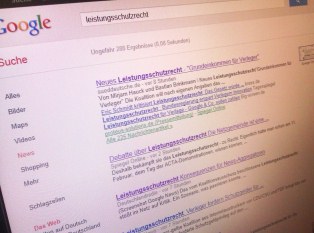German words such as Autobahn, Zeitgeist oder Angst are widely known in the English speaking world. Time to learn a new one: Leistungsschutzrecht.
WTF? Exactly. Google Translate comes up with the term ‚performance protection right‘ and LEO suggests ‚ancillary copyright‘. So, what’s the concept behind this?

The fees would be collected and distributed by a – yet to be established – new copyright collective organization.
Publishing houses claim that they have a right to be compensated for their work – and to participate in the success of aggregators and search sites.
Critics, however, reply that
- it’s the publishers
faultdecision to distribute content for free on the Internet in the first place; - news as such are not protected by copyright law;
- quotes, excerpts and links to articles are protected under the existing quotation right;
- the law would unduly limit freedom of expression, because it prevents the free flow of information.
Already in a 2009 Hamburg Declaration, publishers bemoaned too little protection and compensation of online content and misunderstood claimed that: „Universal access to our services should be available, but going forward we no longer wish to be forced to give away property without having granted permission.“
They did not explain who forced them to give away property and publish their works for free in the first place, though. Intellectual property (IP) rights do apply (and are enforced) already today and even there is no concept of ‚fair use‘ in German legislation, the law recognizes the right of quotation.
Authors, by the way, receive roaylties already today through the collective rights association VG Wort also for online works, so chances are that do not benefit from the planned legislation as much as their publishers would do.
Other commentaries critizise the vague language of the announcement and fear that, for example, small blogs cannot afford to pay fees for simple quotes or links.
Not accepting some new concepts of the information society in a digital world, publishers would aim to limit the free flow of information on the Internet solely for their own benefit, instead of trusting already established IP and copyright frameworks.
So far, no bill has been introduced into the legislative process by the government, but protest among the online community is already growing (#lsr). Wir werden sehen.
